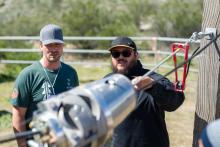Recent Broadband News Roundup - Episode 619 of the Community Broadband Bits Podcast

In this episode of the podcast, Chris is joined by colleagues Sean Gonsalves, Ry Marcattilio, and Jessica Auer to discuss several key topics in the world of broadband. The conversation begins with Jessica’s firsthand account of the devastating impact of Hurricane Helene in Asheville, North Carolina, highlighting the region’s communication challenges during and after the storm. The team delves into the critical importance of resilient telecommunications infrastructure in the face of natural disasters.
Later in the episode, Christopher, Sean, and Ry discuss the political controversy surrounding the FCC’s decision to deny Starlink's bid for Federal Rural Digital Opportunity Fund (RDOF) support, analyzing whether the decision was influenced by political bias. They explore how this case fits into the broader debate about satellite Internet's role in rural broadband access.
Finally, the team shares updates on key broadband initiatives, including a project in South Central Los Angeles and Vermont’s workforce development programs aimed at training the next generation of fiber technicians. This episode provides listeners with a broad overview of community broadband efforts across the United States, offering insights into the challenges and successes of bringing high-speed Internet to underserved areas.
This show is 35 minutes long and can be played on this page or via Apple Podcasts or the tool of your choice using this feed.
Transcript below.
We want your feedback and suggestions for the show-please e-mail us or leave a comment below.
Listen to other episodes or view all episodes in our index. See other podcasts from the Institute for Local Self-Reliance.
Thanks to Arne Huseby for the music. The song is Warm Duck Shuffle and is licensed under a Creative Commons Attribution (3.0) license












